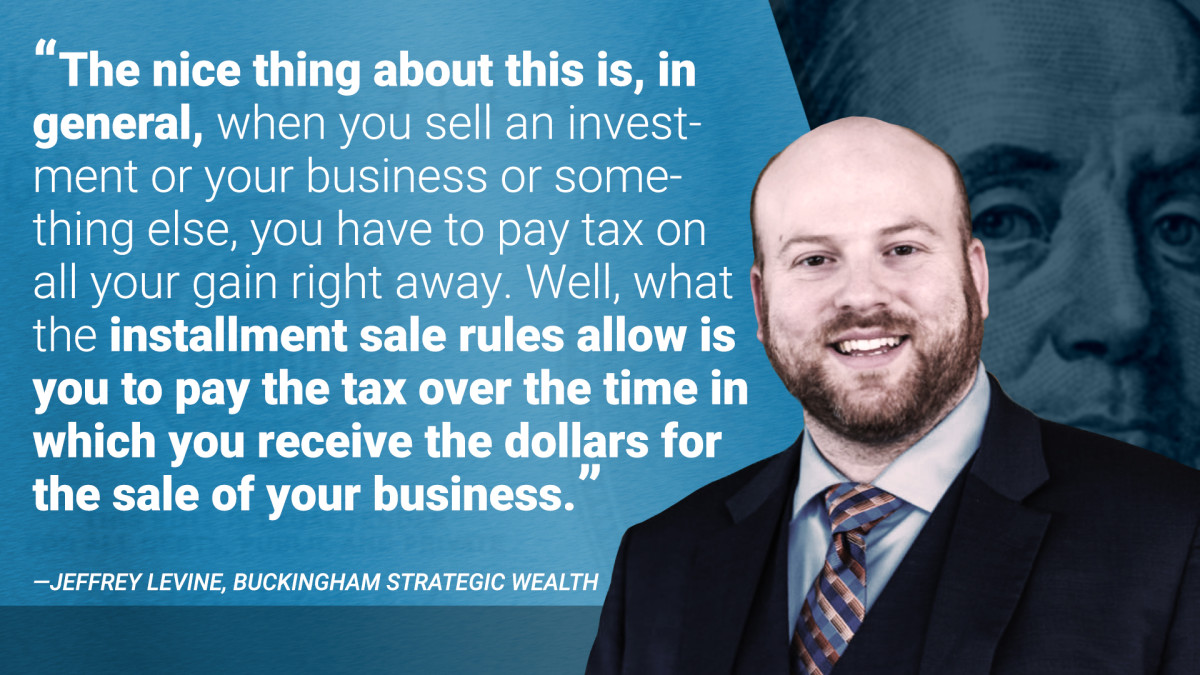Are you a small business owner planning to sell your business? You might want to consider an installment sale, a tax-saving strategy for many.
While there are plenty of pros, there are risks, too.
Retirement Daily’s Robert Powell caught up with Jeffrey Levine, CPA and tax pro from Buckingham Strategic Wealth Partners, to explain everything you need to know about an installment sale.
TurboTax Live experts look out for you. Expert help your way: get help as you go, or hand your taxes off. You can talk live to tax experts online for unlimited answers and advice OR, have a dedicated tax expert do your taxes for you, so you can be confident in your tax return. Enjoy up to an additional $20 off when you get started with TurboTax Live.
Quotes| Pros and Cons of an Installment Sale Jeffrey Levine, Chief Planning Officer, Buckingham Strategic Wealth Jeffrey Levine, Chief Planning Officer, Buckingham Strategic WealthRecommended Read: 7 Ways Small Business Owners Can Reduce Their Tax Bill
Video Transcript| Jeffrey Levine, CPA and Tax Expert, Buckingham Strategic WealthRobert Powell: Are you a small business owner and about to sell your business? Well, what are the pros and cons of an installment sale? And here to talk with us about that is Jeffrey Levine from Buckingham Strategic Wealth. Jeffrey, welcome.
Jeffrey Levine: Good to be with you, Bob. And I’m excited to talk about the installment sale because it is a tax-saving strategy for many.
Robert Powell: So walk us through it.
Jeffrey Levine: Yeah, effectively the installment sale is exactly what it sounds like. You are paid in installments for the sale of your business. Now, the nice thing about this is, in general, when you sell an investment or your business or something else, you have to pay tax on all your gains right away. Well, what the installment sale rules allow is you to pay the tax over the time in which you receive the dollars for the sale of your business. So let’s say you sell your business for $1,000,000. Instead of reporting $1,000,000 of gain in one year, maybe if you have this installment sale over 10 years, for instance, you could have $100,000 of gain over each of those years. And that could help you decrease your capital gains tax. It can help you avoid other things like having Medicare premiums skyrocket.
So the idea with an installment sale is to spread out that tax liability to lower the overall taxes paid on the sale of the business. The biggest downside, of course, is that you have to wait a while to get your money. So you don’t have this giant sum initially. And on top of that, if you don’t get your money right away, well, chances are whoever bought your business is counting on the money they make from your company in the future to help pay some of that installment sale. This means if the person who buys your business runs it into the ground and doesn’t do the same, good job you have. Well, your future payments could be at risk. And that future risk is something that often business owners aren’t willing to accept and is probably the single biggest reason folks will avoid going the installment sale route when that is chosen.
Editor’s Note: The content was reviewed for tax accuracy by a TurboTax CPA expert.
Zach Faulds contributed to the writing of this article and produced the video and/or the graphics associated with it.
